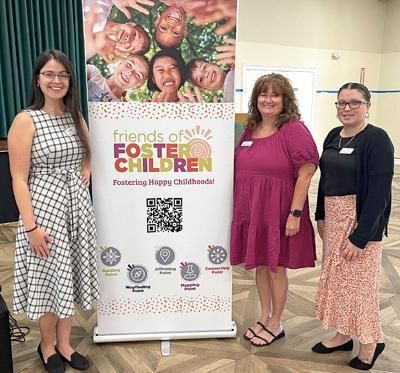
WEST PALM BEACH | Friends of Foster Children, a nonprofit organization in Palm Beach County with a mission to “foster happy childhoods,” was the main presenter at the Luncheon 4 Life July 25 in the social hall at St. Juliana Parish in West Palm Beach. Luncheons 4 Life are monthly pro-life events that feature a complimentary meal for like-minded people to learn and network.
Tying in with the lunch’s life-affirming theme, two speakers explained that their organization aims to help children from infancy to age 18 in the foster care system.
“A child in foster care is removed from their primary caregiver because of abuse or neglect. Now this is where Friends of Foster Children steps in,” said Mariana Lopes, community development coordinator for the agency. “We are with them every step of the way throughout their journey.
“When a kid comes into care, they go to one of two places. One, they go to a traditional foster home, which is probably what most of you are familiar with, or they go to a kinship caregiver,” she said. A kinship caregiver is a relative or friend with an established history or relationship with the child.
Children do better with their family members, Lopes said, so her organization has connection specialists who try to find family members who will assume responsibility for care. When the children are placed with family, their staff works to provide support, going into homes and conducting needs assessments, orientation, offering equipment and help filling out financial aid applications. Whatever they need, she said.
“Unlike a traditional foster home, where people do hours of training and they come prepared for children to be placed with them, we cannot say the same for kinship caregivers,” Lopes explained. They are usually the grandparents, older siblings, aunts and uncles who are often advised of a child’s needs in a middle-of-the-night phone call.
“They do the right thing and they take the children in without hours of training, without support, without resources, until we step in,” she said. Friends of Foster Children provides training for kinship caregivers about how to care for a child, the foster care system, developing better relationships with family members and diving into community resources.
Besides the support given to kinship caregivers, Lopes said, Friends of Foster Children has a “family success center” that gives the children an emergency bag, since some of them arrive with just the clothes on their back. The bag contains new clothes and hygiene products. The organization also has a clothing closet that offers free gently used clothing for the children. Medical care is also available for the children, who often lack health insurance.
Besides receiving help to connect with community events and resources, such as performances at the Kravis Center and “Foster Family Night” at the South Florida Fair, foster parents are invited to twice-a-month support group meetings, said Danielle Gifford, a foster navigator for Friends of Foster Children.
Since the organization is aware that the role of foster parent can be difficult sometimes, two Fridays each month it offers “foster parent night out” for two hours to give the adults a break, Lopes said.
She listed three ways that people in the community can partner with Friends of Foster Children. The organization is in need of volunteers to staff their clothes closet, work in the office or assist in childcare. Donations of toiletries, clothing and school supplies are needed, along with cash from individual and business donors. But perhaps the biggest need is for foster parents to make a difference in the lives of children who have been victimized.
“We currently are short foster parents within Palm Beach County,” said Jane Denny Richardson, program director, who accompanied Lopes and Gifford. “There are 1,400 children in foster care, and they come from all communities.”
Gifford said that, if there is no relative or foster parent available in Palm Beach County, agencies are forced to send the child to a different area of the state. “Imagine you’re 3-, 4-, 5- or 6-year-olds and you’re being taken away from your parent. Now you’re being taken away from your living community,” she said.
Her biggest passion is caring for teenagers in the foster system. “In the past 12 months, our number of children in group homes has risen from 80 children to 104 children, which is a 30 percent increase of children who are not in a family-style setting,” Gifford said. The older children, ages 13 to nearly 18, just need someone “who will step in and change their lives.”
A prospective foster parent must be at least 21 years old, a Florida resident, able to pass a background check and have space at home for a child. They don’t need to be a homeowner, married or have kids of their own.
Anyone interested in being a foster parent is advised to contact Gifford at 561-698-2332 or danielle@friendsoffosterchildren.com. For general information, call 561-352-2540 or visit www.friendsoffosterchildren.com.

